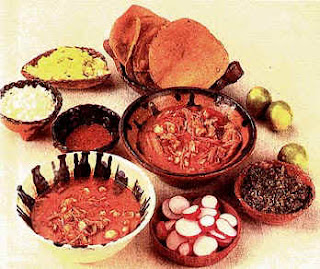 The pozole and menudo (Mexican red soups) were made for special occasions to celebrate family gatherings, the tasty tamales were made during the holiday season, winter break, the pastel de tres leches (three milks cake) during birthday celebrations, and the pinto beans were cooked as an everyday meal. The streets were full of color, the public transportation was full of people with their grocery bags, and the children played soccer or hide-and-seek in their neighborhoods. But my reality, in a new town, Madison, NE, seemed unreal. The pozole and menudo were transforming into chicken noodles, the tamales into pizza, the pastel de tres leches into brownies, and the beans into french-fries potatoes. Everything was different. Slowly, I learned to adapt to the American culture because that is the way society does things around here. I was forced to learn English fast because there were not many Latinos around with whom I could have communicated in Spanish.
The pozole and menudo (Mexican red soups) were made for special occasions to celebrate family gatherings, the tasty tamales were made during the holiday season, winter break, the pastel de tres leches (three milks cake) during birthday celebrations, and the pinto beans were cooked as an everyday meal. The streets were full of color, the public transportation was full of people with their grocery bags, and the children played soccer or hide-and-seek in their neighborhoods. But my reality, in a new town, Madison, NE, seemed unreal. The pozole and menudo were transforming into chicken noodles, the tamales into pizza, the pastel de tres leches into brownies, and the beans into french-fries potatoes. Everything was different. Slowly, I learned to adapt to the American culture because that is the way society does things around here. I was forced to learn English fast because there were not many Latinos around with whom I could have communicated in Spanish.I learned to value what I had left behind at home [Mexico] when I tried to make friends at my new school. In Mexico my friends never made fun of me. In Madison, students were amused with me because I was the new student who did not speak English, and if I spoke English I would sound humorous to others because of my accent. During the phase of making new friends I had the power to ignore those people that did not accept me for who I was. Being the new kid in school who did not speak English was not fun but it was a learning experience. I learned that I am an intelligent young man because of my capacity to learn a new language quickly, adapt to a new culture, and with aptitude I am able to form friendships. I faced many challenges and I bravely confronted others until I felt accepted in a new culture.

Today, as a student affairs professional, in my current position, I have the opportunity to work with international students. I am able to relate my experiences to their experiences. Over the past three months I have learned to recognize that some international students are challenged to adapt to the American culture. They do not understand why in America we focus so much in race and ethnicity. Then, I have to have a conversation and explain why are we asking for acceptance, that historically has not been recognized. They miss traditional homemade food; they miss their family and friends. I have learned to ask about their experience, to create a safe-space, to validate those experiences and their identities, and to provide mentorship, resources and support.
I ask international students, “How is your experience?” I am amazed to hear the challenges and adventures that they face. I am more surprise to know that they do not have faculty and staff that ask them about their experiences. My goal is to see them succeed in their academics and in extra curricular activities, so they can take leadership position.
No comments:
Post a Comment